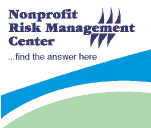|
April 23, 2008
2008 Risk Management and Finance Summit for Nonprofits
Sunday to Tuesday, September 7-9, 2008
Marriott City Center • Minneapolis, MN
Join us at the 2008 Risk Management and Finance Summit for Nonprofits, September 7-9th in Minneapolis, MN, for inspiration and education — as well as validation that peer-to-peer networking in a fun, fast-paced learning environment is prudent risk management!
Special Features at This Year’s Summit Include:
- An opening plenary session, “The Art of Leadership” by Erik Wahl, that is not to be missed! Erik will share his unique approach to empowering leadership and “leveraging chaos to create opportunities.”
- Cutting edge information about the latest trends and technology to assist in background checking for paid and volunteer staff.
- Workshops on advanced financial risk management and fraud prevention.
- Back by popular demand: “Forum for Insurance Agents and Brokers.”
Brush up on the basics at the “Insurance Boot Camp and Coverage Clinic”
- New! A workshop track just for grant-making organizations.
And as always, the Summit will offer challenging topics, including:
- Managing the Risks of Burn-out, Nonprofit Life Cycles, Risks and Rewards of International Programs, Crisis Communication, and Establishing a Meaningful Ethics Program at Your Nonprofit.
- Workshops on governance policies and how the new 990 can move your board towards sound risk management
For a closer look at the agenda and registration, Click Here
Is Your Board Ready for the New 990?
Compensation Policies are gaining attention because the new 990 asks whether boards have a process in place to approve executive compensation. The IRS recently issued Draft Instructions for the New 990 that spell out the three (3) steps boards (or compensation committees) are expected to take in order to approve compensation for key staff and officers, including board members if they are considered “top management.” According to the draft instructions (see draft instructions for Section IV), boards are expected to:
- Review and approve compensation in accordance with conflict of interest policies;
- Use comparability data for “similarly qualified persons in functionally comparable positions at similarly situated organizations;” and
- Keep contemporaneous records of the decision-making and deliberations of the board (or compensation committee).
The IRS is accepting comments from the public on the draft instructions through June 1st, 2008.
Need Assistance Developing a Conflict of Interest Policy for Your Nonprofit?
Does your nonprofit use an annual disclosure questionnaire to raise awareness about conflicts of interest and spark discussions about its conflict policy? Staff at the Nonprofit Risk Management Center are available to assist you with policy development through the Center’s affordable consulting services. You can also brush up on the basics by joining us for next month’s Webinar, 2-3 pm EST, Developing and Managing Conflicts of Interest Policies.
Your Questions Answered by the Center’s Staff
If you have a question, just go to our web site, click on the ADVICE tab and select “Technical Assistance.” A simple form allows you to submit your question to our staff experts. We’ll respond within 48 hours and you can look for your question in a future eNews!
Q: One of our employees would like to run for Town Council. Do most nonprofits allow this? Isn’t it a conflict of interest?
A. It is generally not possible to control what employees do on their own time, and it may actually be helpful to have an employee who is a recognizable leader in the community. However, the situation may also result in what is known as a “duality of interest” because the interest of the town may not be consistent with the interest of the nonprofit. This is the time to establish clear expectations for your employee about the time commitment his job with your nonprofit requires, underscoring that it would be unacceptable if his outside pursuits interfered with his job performance. You may also want to refer to his duty, as an employee of the nonprofit, to be loyal to the nonprofit's interests, and how that might create a conflict of interest should he have to make any decisions about issues that are contrary to the nonprofit’s best interests.
Another potential conflict may arise if he is interviewed by the media either while he’s a candidate or after he has been elected to the Town Council. He should not make any statements as a spokesperson of the nonprofit — and should clarify for the press that his statements are made in his capacity as a citizen and Town Council member, not an employee of the nonprofit. Similarly, the nonprofit may not endorse or support (or oppose) his candidacy for public office.
Q. Is it alright to convert one of our employees into an independent contractor?
A. It may be fine — depending on whether the worker would meet the qualifications of an independent contractor. Employers should not classify workers based on what the worker desires. Instead, every position should be analyzed to determine whether it is properly classified. The risk of misclassifying a worker is significant: in addition to back withholding taxes (that are taken from employees’ wages but not contractors’) penalties can be assessed, and in some cases back-overtime may be owed. As a starting point we suggest you review the document that IRS examiners use to determine how to classify a worker as an employee or independent contractor. It is available on the IRS web site. This may be a situation where it would be worth the investment to hire a lawyer familiar with employment law to provide guidance. The Center has a publication that you may be interested in: Taking The High Road is an easy-to-read book, chock- filled with information on human resource issues such as this one.
|


